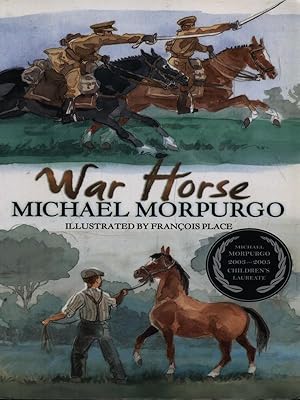

But to be fair, this is a different type of book and Joey is telling his story in a different way. I kept forgetting that Joey was supposed to be a horse as I thought he sounded very much like a human narrator would. And yet I found Black Beauty a much more convincing horse narrator than Joey. I should point out that Joey is not a talking horse and although he does interact with other horses, including his best friend Topthorn, he never actually ‘speaks’ to them in the way Black Beauty does. I couldn’t help comparing this book to Anna Sewell’s Black Beauty, another book narrated by a horse and one of my absolute favourites from my childhood.

Many of the horses serving with Joey are killed in their very first battle (the thought of leading a cavalry charge into a line of machine guns is so horrible to think about) and more of them die of hunger, illness or exhaustion after being forced to pull guns that are too heavy for them up hills and through deep mud. Seeing things through Joey’s eyes gave a fascinating new perspective and has helped me to learn a little bit about an aspect of the war I had never really considered. The rest of the story follows Joey’s experiences in France, first with the British cavalry and then pulling ambulances and artillery for the German army, but will he survive the war and will he ever be reunited with Albert?īeing an animal lover, I’m ashamed to admit that I had never given much thought to the suffering of the horses involved in the First World War or what happened to them after the war was over. However, the family are struggling to pay their rent and when war breaks out in 1914, Joey is sold to an army officer as a cavalry horse. The farmer soon regrets this decision but his son, Albert, forms a special bond with Joey and trains him to work on the farm, determined to prove to his father that he hasn’t wasted his money. The story is narrated by Joey, a young thoroughbred horse, who is bought at auction by a poor farmer from Devon. War Horse has a strong anti-war message and shows us the horrors of World War I from a very unusual perspective. And War Horse, like all the best children’s books, is a book that can be enjoyed by people of all ages.

But last week I read my second Michael Morpurgo book, War Horse, because I had decided to go to see the new Steven Spielberg film and wanted to read the book first.

The only one of his books that I read was Twist of Gold, at an age when I was starting to consider myself ‘too old’ for the children’s section of the library, and all I can remember is that it was about two children from Ireland who go to America to find their father during the Irish potato famine, and that it made me cry. Despite being an avid reader as a child, I somehow missed out on Michael Morpurgo.


 0 kommentar(er)
0 kommentar(er)
